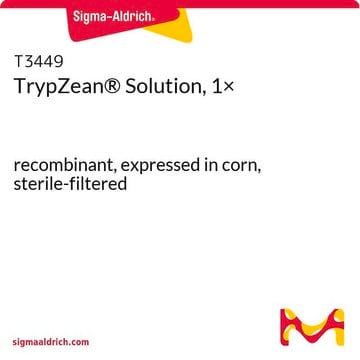T2605
Solution de trypsine-EDTA
5X, sterile-filtered, BioReagent, suitable for cell culture, 2.5 g porcine trypsin and 0.2 g EDTA, 4Na per liter of Hanks′ Balanced Salt Solution with phenol red
Synonyme(s) :
Trypsin-EDTA solution
About This Item
Produits recommandés
Niveau de qualité
Stérilité
sterile-filtered
Gamme de produits
BioReagent
Concentration
5X
Technique(s)
cell culture | mammalian: suitable
Conditions d'expédition
wet ice
Température de stockage
2-8°C
Vous recherchez des produits similaires ? Visite Guide de comparaison des produits
Application
Actions biochimiques/physiologiques
Caractéristiques et avantages
- Save Time - no more freeze or thaw cycles
- Save Space - store at 2-8°C and free up your freezer
- Does not need to be aliquoted
- Only the best for your cells - manufactured in GMP environment
Composants
Notes préparatoires
Stockage et stabilité
Informations légales
Code de la classe de stockage
12 - Non Combustible Liquids
Classe de danger pour l'eau (WGK)
WGK 1
Point d'éclair (°F)
Not applicable
Point d'éclair (°C)
Not applicable
Faites votre choix parmi les versions les plus récentes :
Certificats d'analyse (COA)
Vous ne trouvez pas la bonne version ?
Si vous avez besoin d'une version particulière, vous pouvez rechercher un certificat spécifique par le numéro de lot.
Déjà en possession de ce produit ?
Retrouvez la documentation relative aux produits que vous avez récemment achetés dans la Bibliothèque de documents.
Les clients ont également consulté
Notre équipe de scientifiques dispose d'une expérience dans tous les secteurs de la recherche, notamment en sciences de la vie, science des matériaux, synthèse chimique, chromatographie, analyse et dans de nombreux autres domaines..
Contacter notre Service technique










